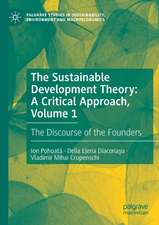The Sustainable Development Theory: A Critical Approach, Volume 2: When Certainties Become Doubts: Palgrave Studies in Sustainability, Environment and Macroeconomics
Autor Ion Pohoaţă, Delia Elena Diaconaşu, Vladimir Mihai Crupenschien Limba Engleză Paperback – 6 oct 2022
This book explores the present conflictual relationship between the economy, the environment, and society. The current mainstream economic model is analysed from the perspective of the founding economists to review its suitability to tackle issues of sustainable development. The problems of redistribution and social justice are debated at length; alongside those concerning the giant state, degrowth, and a vision of sustainability that is founded on the idea of a self-regulating free market economy. Business cycle sustainability, anti-crisis therapy, technological unemployment, the natural rate of interest, and the Bruntland matrix are also examined.
This book aims to present a holistic approach to sustainable development where social, ecological, and economic components are balanced. It will be relevant to students and researchers interested in this topic.
| Toate formatele și edițiile | Preț | Express |
|---|---|---|
| Paperback (1) | 639.59 lei 43-57 zile | |
| Springer International Publishing – 6 oct 2022 | 639.59 lei 43-57 zile | |
| Hardback (1) | 643.65 lei 43-57 zile | |
| Springer International Publishing – 6 oct 2021 | 643.65 lei 43-57 zile |
Preț: 639.59 lei
Preț vechi: 752.45 lei
-15% Nou
Puncte Express: 959
Preț estimativ în valută:
122.42€ • 133.02$ • 102.90£
122.42€ • 133.02$ • 102.90£
Carte tipărită la comandă
Livrare economică 21 aprilie-05 mai
Preluare comenzi: 021 569.72.76
Specificații
ISBN-13: 9783030613242
ISBN-10: 3030613240
Pagini: 285
Ilustrații: XIV, 285 p. 1 illus.
Dimensiuni: 148 x 210 mm
Greutate: 0.4 kg
Ediția:1st ed. 2021
Editura: Springer International Publishing
Colecția Palgrave Macmillan
Seria Palgrave Studies in Sustainability, Environment and Macroeconomics
Locul publicării:Cham, Switzerland
ISBN-10: 3030613240
Pagini: 285
Ilustrații: XIV, 285 p. 1 illus.
Dimensiuni: 148 x 210 mm
Greutate: 0.4 kg
Ediția:1st ed. 2021
Editura: Springer International Publishing
Colecția Palgrave Macmillan
Seria Palgrave Studies in Sustainability, Environment and Macroeconomics
Locul publicării:Cham, Switzerland
Cuprins
Chapter 1. First Steps In Perverting Sustainability.- Chapter 2. In Search Of A Lost Lesson.- Chapter 3. How To Conceive The Brundtland Agenda In The Context Of The Nominal Economy’s Imperialism.- Chapter 4. Social Pressure.- Chapter 5. Degrowth - A Logical Inadequacy?.- Chapter 6. Nature – The Highlight Of The Theory Of Sustainability.- Chapter 7. General Conclusions.
Notă biografică
Ion Pohoaţă is Professor at the Faculty of Economics and Business Administration, Alexandru Ioan Cuza University of Iasi, Romania.
Delia-Elena Diaconaşu is Research Fellow at the Social Sciences and Humanities Research Department, Institute for Interdisciplinary Research, Alexandru Ioan Cuza University of Iasi, Romania.
Vladimir-Mihai Crupenschi is Associate Lecturer at the Faculty of Economics and Business Administration,, Alexandru Ioan Cuza University of Iasi, Romania.
Delia-Elena Diaconaşu is Research Fellow at the Social Sciences and Humanities Research Department, Institute for Interdisciplinary Research, Alexandru Ioan Cuza University of Iasi, Romania.
Vladimir-Mihai Crupenschi is Associate Lecturer at the Faculty of Economics and Business Administration,, Alexandru Ioan Cuza University of Iasi, Romania.
Textul de pe ultima copertă
This book explores the present conflictual relationship between the economy, the environment, and society. The current mainstream economic model is analysed from the perspective of the founding economists to review its suitability to tackle issues of sustainable development. The problems of redistribution and social justice are debated at length; alongside those concerning the giant state, degrowth, and a vision of sustainability that is founded on the idea of a self-regulating free market economy. Business cycle sustainability, anti-crisis therapy, technological unemployment, the natural rate of interest, and the Bruntland matrix are also examined.
This book aims to present a holistic approach to sustainable development where social, ecological, and economic components are balanced. It will be relevant to students and researchers interested in this topic.
Caracteristici
Explores the social layer of sustainable development and how it can be utilized Embraces the diversity of opinion on sustainable development and the dynamic discussions they create Suggests that Solow’s line of thought is the most realist in reconciling nature with the economy and society




